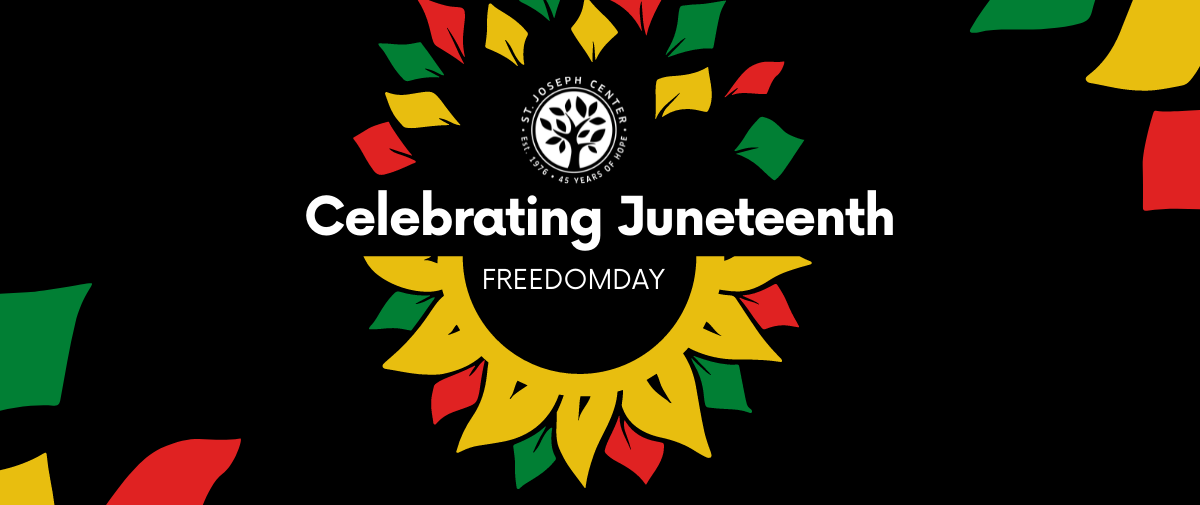
Celebrating Juneteenth
06/17/2022
Los Angeles, CA
In celebration of Juneteenth, we wanted to share this reflection with you written by Debra Jackson, who is a member of St. Joseph Center’s Diversity, Equity, Inclusion & Transformation Committee
In celebration of Juneteenth, we wanted to share this reflection with you written by Debra Jackson, who is a member of St. Joseph Center’s Diversity, Equity, Inclusion & Transformation Committee:
Juneteenth (short for “June Nineteenth”) is a Holiday celebrated on June 19th to commemorate the emancipation of enslaved African people in the United States.
The story of emancipation is a story about disenfranchised enslaved people who worked within the guidelines of the Constitution of the United States, not only freed themselves but helped to save this Union.
It’s possible you’ve never heard of Juneteenth, but for many Americans, it’s a holiday that holds significant meaning. It is a time for deep reflection, honoring the ancestors, and partaking in joyful celebrations.
On July 4th, 1776, The Declaration of Independence was approved granting freedom for White people, while at the same time other laws were being created to subjugate and enslave people of African descent.
Before President Lincoln could move forward with emancipation, he needed a victory. He also needed the help of African Americans to win.
However, due to fear, African Americans could not take part in their emancipation. Fear of what armed slaves might do resulted in laws that banned men of African descent from enlistment in the Federal army aka Federal Militia. However, in 1862 congress passed the militia act granting President Lincoln the power to employ any American of African descent for military purposes.
More than 200,000 African Americans joined the fight against the rebels. The battle at Antietam was the deadliest one-day battle in American military history. When describing African American soldiers, General Benjamin Butler is quoted as writing, “better soldiers never shouldered a musket.”
This victory gave President Lincoln the confidence to issue the preliminary Emancipation Proclamation. The proclamation declared that as of January 1, 1863, all enslaved people in the states currently engaged in rebellion against the Union “shall be then, thenceforward, and forever free.”
Here is where Juneteenth emerged —Texas. Many enslavers from outside the Lone Star State had moved there, as they viewed it as a safe haven for slavery. At the time, Texas held approximately 300,000 enslaved people. Although emancipation didn’t happen overnight for everyone—in some cases, enslavers withheld the information until after harvest season.
It would be two and a half years after President Lincoln signed the Emancipation Proclamation for the enslaved people of Texas to get the news. on June 19, 1865, General Granger along with 2,000 troops arrived in Galveston Texas where he delivered the proclamation that enslaved Africans were indeed free.
Celebrations broke out among newly freed African people, and therein Juneteenth was born. In December of 1865, slavery in America was formally abolished with the adoption of the 13th Amendment.
Almost a century later when Dr. Martin Luther King Jr gave the “I Have A Dream” speech, I wonder if he was thinking about the Galveston Texas enslaved souls who finally received the news when he said, “Free at last, free at last, thank God almighty, we’re free at last!”
Citizens of the United States, the government won’t change our fate, and as citizens, we must act. At St. Joseph Center, we are fortunate to have a Chief Executive Officer, Dr. Va Lecia Adams-Kellum who “ACTS”. She is committed to the principles and implementation of Diversity, Equity, Inclusion, and Transformation.
Dr. Adams along with the senior staff carry this out by purposefully including people from a range of different social, ethnic, gender, and sexual orientation backgrounds. Dr. Adams understands the injustices of institutional racism, and she has worked tirelessly to ensure that diversity and equity are implemented.
I’m grateful for their ongoing commitment to exploring creative policy changes that will ensure and extend access to employees who may need more support to take fair advantage of opportunities at St. Joseph Center. Happy Juneteenth everyone!
Centering Racial Equity in the Work to End Homelessness
Presented by St. Joseph Center CEO & President Dr. Va Lecia Adams Kellum and Nichelle Carver, Associate Director, Homeless and Special Needs Housing
Racial equity is also a substantial part of St. Joseph Center’s mission to address ending homelessness. In recognition of Juneteenth, we acknowledge the past and how we are reshaping the system today to provide more affordable and equitable housing for underserved communities facing racial disparities.
Watch “Centering Racial Equity in the Work to End Homelessness” presentation here:
